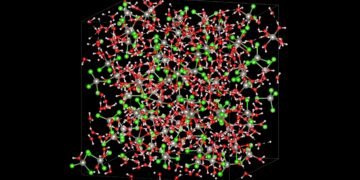Multiple myeloma is a cancer of the bone marrow that kills more than 100,000 people every year. Known for its rapid spread and lethality, this disease is one of the most difficult to combat.
As these cancer cells move to different parts of the body, they mutate, bypassing possible treatments. People diagnosed with multiple myeloma who receive chemotherapy only live three to six months.
New treatments are needed to prevent the spread of this disease and provide a fighting chance for those who suffer from it.
Michael Mitchell, J. Peter and Geri Skirkanich, assistant professor of innovation in bioengineering (BE), and Christian Figueroa-Espada, doctoral candidate in BE at the School of Engineering and Applied Sciences at the University of Pennsylvania, developed a treatment from RNA nanoparticles (Advanced RNA nanoparticle therapy) that prevents multiple myeloma moving and mutating.
The treatment, described in their study published in PNAS, turns off the activity that attracts cancer to blood vessels, turning off the path through which multiple myeloma cells travel. By stopping this “chemical GPS” that causes the migration of cancer cells, the group’s treatment stops the spread of multiple myeloma, helping to eradicate it completely.
Endothelial cells, the cells that line blood vessels, make proteins that we need to live. This protein, CyPA, is responsible for folding and transporting other proteins. It also activates the T-cell response when we are sick.
However, in multiple myeloma, endothelial cells express CyPA and secrete it into blood vessels where its function is impaired. Here, CyPA is a chemoattractor, meaning it attracts multiple myeloma cells from the bone marrow into the blood vessels where they travel quickly to other bones in the body.
“To stop the spread, we wanted to disable this CyPA activity using RNA therapy, targeting the cancer microenvironment instead of the cancer cells themselves,” Mitchell says. “But getting nucleic acids into the marrow is difficult because of the complex barriers.”
To get RNA into the hard-to-reach bone marrow, the team needed to modify traditional lipid nanoparticle delivery vehicles. Figueroa-Espada says,
“We designed a new hybrid nanoparticle that can deliver small RNA (siRNA) that interferes with endothelial cells.” “SiRNA inhibits cells from producing CyPA.
When tested in vitro, the treatment prevented the spread of cancer cells. When tested in mice, both alone and in combination with chemotherapies, our treatment can reduce tumor size, prolong life and reduce cancer resistance to chemotherapy.
“This work could help improve current treatments for multiple myeloma and other cancers that spread through the blood vessels,” Mitchell adds.
“Using our platform for targeted nanoparticle development, we hope to study cancer and other diseases where CyPA is overexpressed.
By creating roadblocks in the cancer’s journey through the body, the Penn Engineering team is removing a long-standing obstacle to the treatment of multiple myeloma, offering real hope to those diagnosed with the disease.
In future work, the group plans to investigate the disruption of other functions in the microenvironment of cancer to overcome drug resistance, cancer initiation and metastasis.
They are currently working with Ruben Carrasco, professor of pathology at the Dana-Farber Cancer Institute and co-author of the study, to find out the possibilities for this type of treatment. Once RNA nanoparticle therapy is proven effective in large animals, this proof-of-concept study can move into clinical trials.
Source: University of Pennsylvania



































